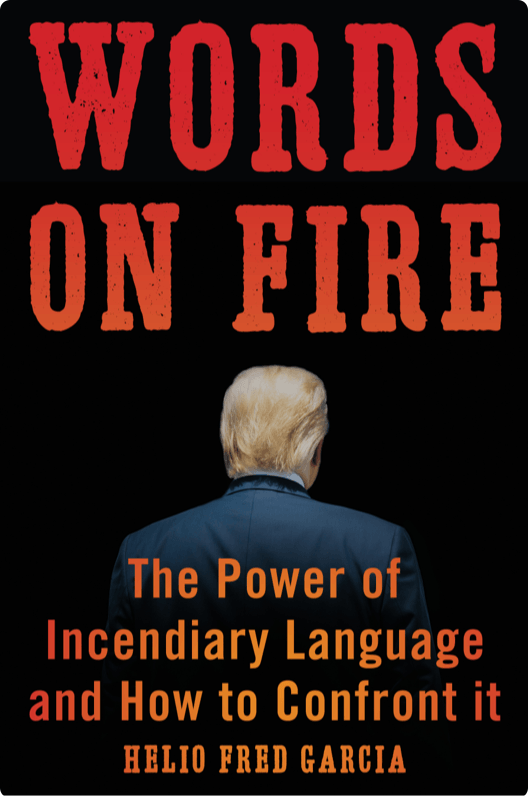Incendiary Rhetoric
Words on Fire, by Helio Fred Garcia, anticipated an insurrection. In the book, Garcia shows that words can do great harm. Further, he explains how people can hold leaders accountable to prevent such harm. Moreover, as his primary case, Garcia points to the language of former President Trump. Predictably, Trump’s rhetoric coerced a large number of people to think a certain way. Over time, he convinced them to condone and commit violence. In the end, we witnessed the tragic outcome on January 6, 2021.
Specifically, in Words on Fire, Garcia outlines a playbook of the steps leading to mass violence. More particularly, the path consists of twelve identifiable forms of communication. Not surprisingly, disturbing rhetoric is not new. Earlier in the twentieth century, the Nazis used all twelve forms. Then came the McCarthy era hunt for communist sympathizers. More recently, the Rwandan Hutu used ten of the twelve forms. And now, Trump uses all twelve forms.
Beyond Trump, the radical right pumps out its incendiary rhetoric through social media. Consequently, incendiary language triggers lone wolves to commit violence. This result is important for several reasons. First, Garcia labels this rhetoric lone-wolf whistle violence, on the model of “dog whistle” politics. Second, he bases his insightful analysis on the most recent scholarship on lone wolves. Third, he explains their mindset. And finally, he specifies what it takes to activate them to commit violence.
Real-World Violence
With shocking foresight, the book documents Trump’s increasingly dangerous rhetoric. That is to say, it surveys what he said during his campaign and term as president. Likewise, it points out how Trump’s rhetoric motivated some lone wolves to commit violence. Even more importantly, it details changes in the nation’s political culture and media. Predictably, these changes led to Trump’s nomination and presidency. On the other side, not all leaders use incendiary language. For instance, when it was shown to put people’s lives in danger, people can alter what they say. To that end, Garcia profiles leaders who dialed back their rhetoric.
Ultimately, Words on Fire concludes with a call to action. As a result, we can learn the lessons of today to prepare for tomorrow. Lessons learned from the book can help people from all walks of life. Thankfully, civic leaders, engaged citizens, journalists, and public officials can learn recognize incendiary language for what it is. Finally, we can take steps to hold other leaders accountable in the future when they use such language.
Radius Book Group is genuinely an author-focused publisher. Words on Fire is my fifth book, and Radius is my fifth publisher. And it is the publisher with whom I’ve had the best experience. Unlike my prior publishers (including one well-known academic press and one well-known business book publisher) Radius delivered on every promise and expectation.
The entire process went smoothly, and despite COVID-19 lock-down for most of the publication process, the book was published on time and successfully. The editor took a 105,000 word manuscript and got it to 75,000 expertly, in a way that makes the book hold together much better than what I had submitted. The cover design and interior design were excellent, greatly improving the book. The editorial staff was in frequent contact through all phases of the book.
Fred Garcia




